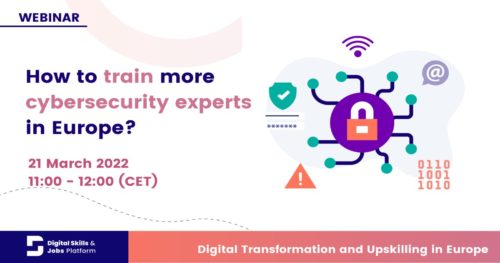On March 21, 2022 a webinar on “How to train more Cybersecurity experts in Europe” was held by the European Commission – Digital Skills & Jobs Platforms. EfVET, as a REWIRE project partner and leader of the WP7 Dissemination & Exploitation of Results, attended with great interest the online event in which over 30 people participated.
Moderated by Justina Bieliauskaite, Project Director at European DIGITAL SME Alliance, the session started with a welcome message and brief opening from Jakub Kajtman, European Commission – DG CNECT: Digital Economy, Recovery Plan and Skills. He pointed out the fact that in this digitalisation era, cybersecurity is becoming more and more important, and “not only we need people to be able to secure their passwords, communications with friends, but also cybersecurity experts to ensure critical infrastructures in multiple sectors”. In addition, he highlighted that some studies say this year Europe will face a shortage of 350,000 experts, so it is important to assess how to bridge that gap and how can cybersecurity experts be trained.
Professor Jason R.C. Nurse, from the University of Kent, and one of the authors of the ENISA report on “Addressing Skills Shortage and Gap Through Higher Education,” presented the main findings and recommendations from the study.
The report found that in the last years, especially the last five or six, there has been a significant increase in the number of programmes offered by the higher education system, most of them being master’s degrees. Overall, these programmes match the skills required, but there is still room for improvement. Indeed, some skills such as Law, Compliance or Privacy are underrepresented, which requires more diversity in the offered programmes.
Another key finding of the study, which is very positive, is that the number of enrolled students is increasing. This is closely related to the number of graduate students in cybersecurity, which is estimated to double in the next two to three years. However, although all these findings are important, there is an issue that still needs to be emphasised: gender balance. Looking at the percentage of new students enrolled, there is a big difference between female (20%) and male (80%).
Three recommendations from the report were highlighted during the presentation: 1) Increase enrolments and eventually graduates, 2) Promote analysis of the cybersecurity market needs and trends, and 3) Increase collaborations between Member States.
The webinar was followed by a discussion panel on how to train more cybersecurity experts in Europe, where three panellists participated: Miguel Gonzalez-Sancho, Head of the Cybersecurity Technology and Capacity Building Unit in the European Commission, DG CNECT; Valentin Negoita, President of APDETIC, Romania National Coalition; and Gordon Kirstein, Movetech-IT solutions.
Miguel Gonzalez-Sancho reiterated that indicators show there are not enough experts on cybersecurity in Europe. He also explained that although the European Commission has different actions, programmes, and initiatives ongoing to tackle the skills gap, it requires cooperation from all the actors involved.
Valentin Negoita talked about concrete initiatives that exist in Romania and explained the perspective at the Member State level. Besides the Romanian National Security Strategy and Action Plan 2022-2027, some concrete initiatives have been taken in the country to address the skills shortage. For example, the Informal School of IT aims to bridge the gap between recruitment and digital talents. Some schools also organise the so-called ‘cybersecurity circles’, which are coordinated by the local principals or IT professors, and aim to give advice and examples on how to protect the identity and avoid cyberattacks. Finally, he mentioned a Guide on Cybersecurity that was addressed to children and students in Romania.
Finally, Gordon Kirstein offered a different perspective, which is the one from the companies’ side. He focused on the need of starting to train students on IT and cybersecurity skills from much earlier than higher education levels. In fact, he pointed out that starting from first grade, children should have some knowledge, considering the early ages at which they have their first mobile phones and access the Internet nowadays.


